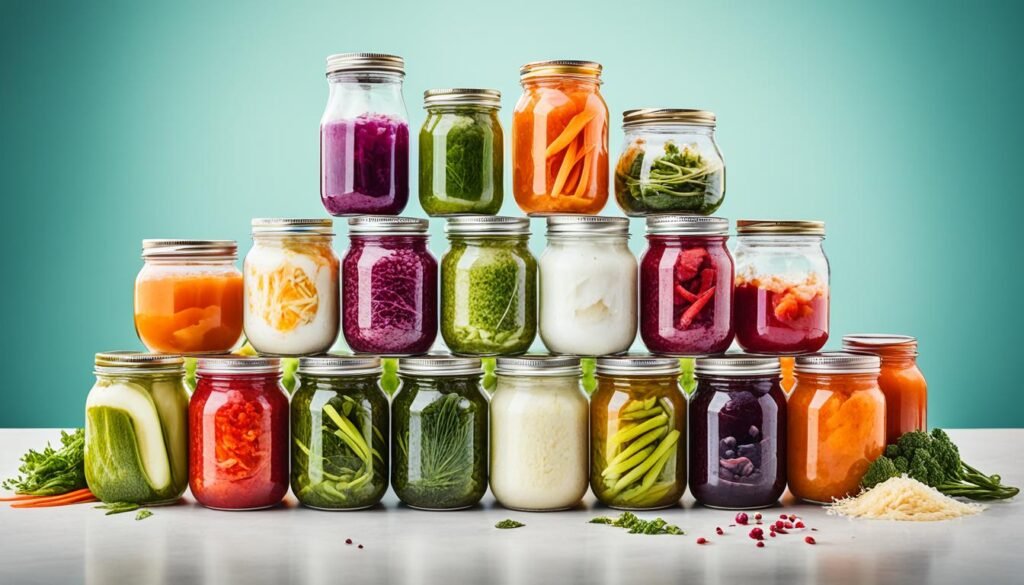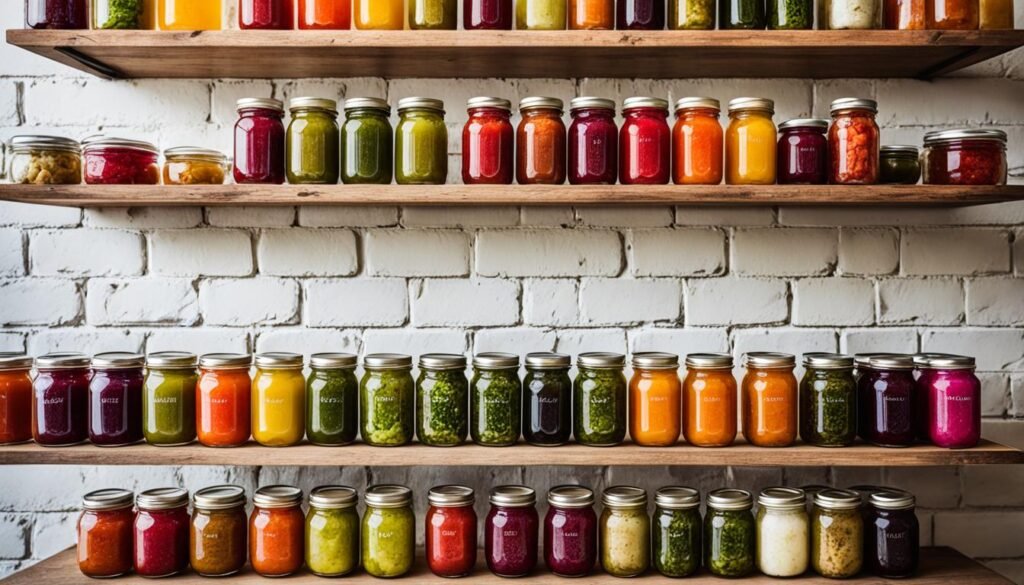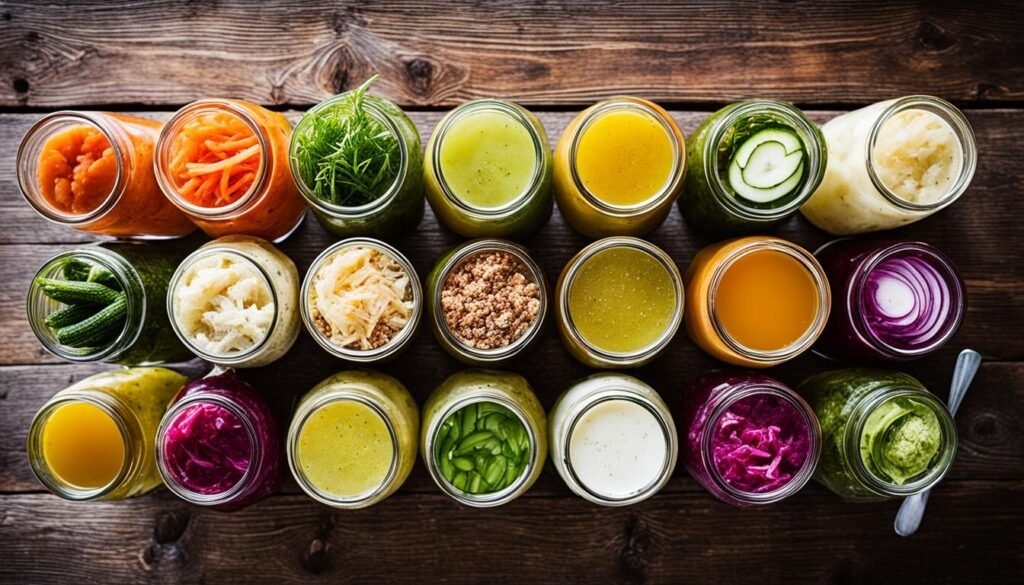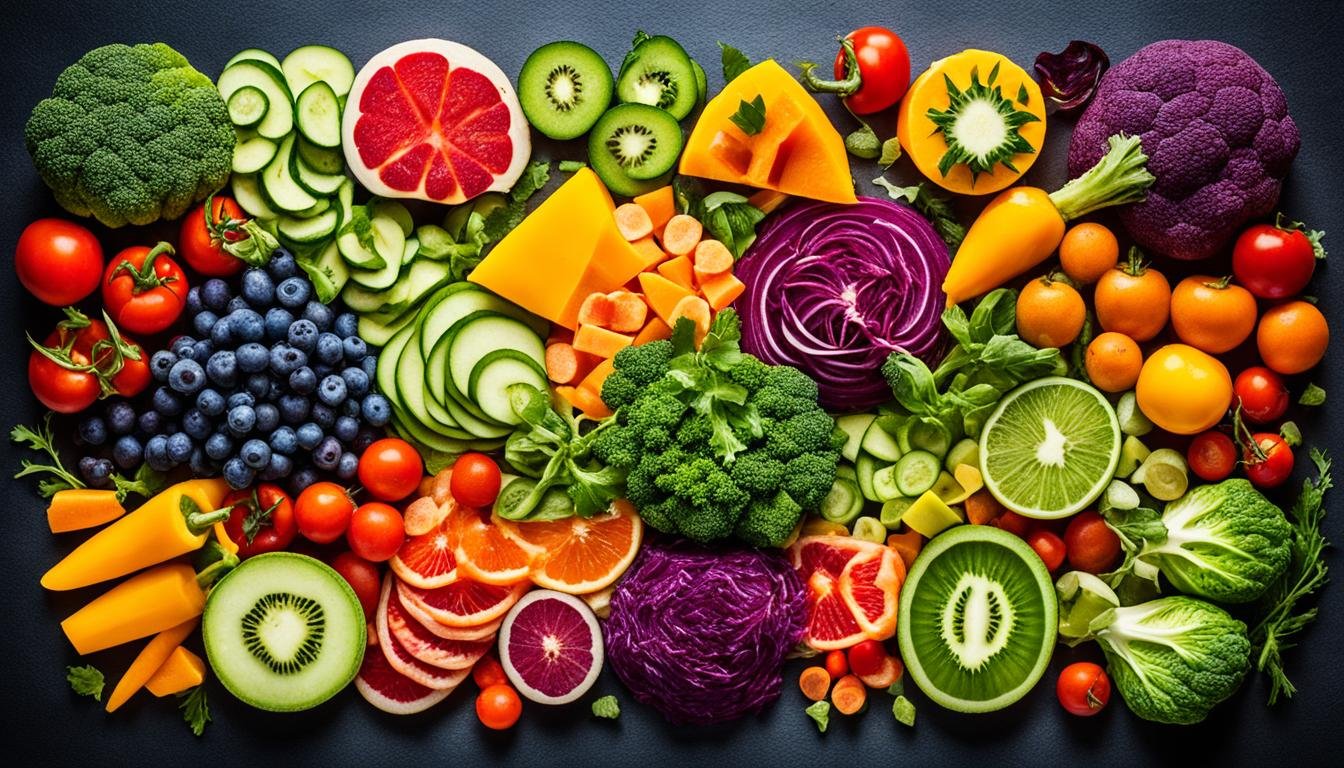Discover the amazing benefits of eating fermented foods daily for a month. It can boost your gut health, improve digestion, and make you feel better overall.1 These foods are a powerhouse of nutrition, giving you vitamins, minerals, and helping your body absorb nutrients better.2 Eating fermented foods every day means you could have a healthier gut, a stronger immune system, less inflammation, and maybe easier weight control.
Key Takeaways
- Fermented foods are rich in probiotics that support a healthy gut microbiome.
- Consuming fermented foods can boost immune function and reduce inflammation.
- Fermented foods may aid in weight management and metabolic health.
- Incorporating a variety of fermented foods into your diet can provide a range of nutritional benefits.
- Moderation and awareness of individual tolerance are important when adding fermented foods to your diet.
Introduction to Fermented Foods
Fermented foods come to be through a cool process. Here, bacteria and yeast change sugars into different compounds. This makes food last longer, taste better, and gives health boosts.3 For centuries, people have made things like Kefir from the Caucasus, Kimchi in Korea, and Kombucha from Northeast China. These foods are part of rich food traditions everywhere.3
What are Fermented Foods?
Fermented foods change with the help of tiny living things. These things eat the sugars in food, making new compounds. This not only keeps food good but also makes it taste and do good things for us. Think of yogurt, kefir, kimchi, sauerkraut, miso, tempeh, and kombucha.
The Fermentation Process
Fermenting is about letting certain tiny things grow in our food. Mainly, bacteria and yeast are at work. They turn the food’s sugars into helpful things like lactic acid and enzymes. This process keeps food good longer and helps our bodies use the nutrients better.
Types of Fermented Foods
The variety of fermented foods is wide. It includes things from many places and food cultures. You might know and love:
- Dairy products: Yogurt, kefir, cheese
- Vegetables: Kimchi, sauerkraut, pickles
- Legumes: Tempeh, miso, natto
- Beverages: Kombucha, kvass, vinegar
- Grains: Sourdough bread, beer, sake
Each fermented food has a special taste, feel, and health use. They are a great part of any meal plan.
Nutritional Benefits of Fermented Foods
Fermented foods add essential vitamins and minerals to your meals.3 The fermentation process boosts nutrient absorption by removing harmful compounds.4 Kimchi is full of vitamins and minerals like A, C, K, and calcium.3
Rich in Vitamins and Minerals
Fermented foods bring lots of vitamins and minerals to your plate.3 Things like yogurt and kefir are rich in calcium and help your body absorb B12 and D.3 Foods like sauerkraut and kimchi offer vitamins C and K, plus minerals iron and magnesium.3 And miso paste from Japan provides B12, K, and minerals copper, manganese, and zinc.3
Enhanced Nutrient Absorption
Fermentation keeps food nutrients safe and even makes them easier for your body to use.4 This process turns natural sugars into energy your body can use better.4 It also gets rid of anti-nutrients, like phytic acid, that block minerals such as iron and zinc from helping your body.4 Better nutrient availability helps your body get the most from fermented foods.4

Adding fermented foods to your diet gives you a great nutritional lift.3 From yogurt to kimchi and kombucha, these foods offer key vitamins and minerals.3 They help keep your health on track.3
| Fermented Food | Nutritional Benefits |
|---|---|
| Yogurt | Improved gut health, better heart health, reduced cancer risk, and enhanced bone health.3 |
| Kefir | Potential benefits for blood sugar control, gut health, weight loss, and anti-inflammatory effects.3 |
| Kimchi | Lower cholesterol levels and improved blood sugar regulation.3 |
| Sauerkraut | Alleviated symptoms of irritable bowel syndrome and lower cholesterol levels.3 |
| Kombucha | Promotion of a diverse gut microbiome, anti-inflammatory effects, and a healthier skin microbiome.3 |
| Miso | Better blood sugar control, reduced risk of certain cancers and heart disease, and improved gut health.3 |
| Fermented Cheeses | Improved gut health and healthy cholesterol levels.3 |
| Sourdough Bread | Provides prebiotics and may be suitable for individuals with moderate gluten intolerance.3 |
| Apple Cider Vinegar | Potential to improve blood sugar control and cholesterol levels.3 |
Probiotics and Gut Health
Fermentation makes probiotics – good bacteria for us.5 These tiny organisms travel in our bodies and help the good microbes in our gut.5 Many studies show a mix of healthy gut bugs helps our immune system, our body’s use of food, and our general well-being.6 Eating foods like sauerkraut, kimchi, or yogurt adds these helpful probiotics to our gut.
What are Probiotics?
5 The World Health Organization and the Food and Agriculture Organization say probiotics are live bugs giving us health pluses.5 They boost the bacteria team in our body, which is now more understood and used for our wellness.5 So, eating foods or taking pills full of probiotics is key to keeping our gut healthy. This is really important for our know-how on taking care of our digestive organs.
Fermented Foods as Natural Probiotics
5 Fermented foods are really ‘in’ right now. They show that people are more into taking care of their gut and using probiotics.6 Kefir stands out for its probiotics and helps those who can’t digest milk well.6 Kimchi, a kind of sour cabbage, has good bacteria that could boost how our digestive system works.6 Miso, a paste made from soybeans, is also good. It’s packed with protein, fiber, and vitamin K. Plus, it might lower chances of getting cancer, help with weight, and keep our blood pressure in check.
Benefits of Probiotics for Gut Health
6 Yogurt is tied to making our bones, heart, and gut stronger.6 Sauerkraut, a kind of fermented cabbage, is full of fiber, vitamins C and K, and eye-protecting stuff.7 A study in 2018 said kimchi might lower our bad cholesterol, manage weight, drop blood pressure, and tame body inflammation.6 Kombucha, a fizzy tea, could do some good, but scientists need more studies to be sure.
7 As of 2021, a look at kefir’s benefits points to help against diabetes, heart disease, better immunity, and brain health.6 Pickles, if made right, are low-cal, rich in vitamin K, and give our gut good bacteria.6 In places like India, Nepal, and Pakistan, traditional buttermilk is still a hit. It’s a good source of probiotics, unlike the kinds you find in U.S. stores.
6 Tempeh is great for protein and vitamin B12. It’s a smart pick for those avoiding meat.7 A recent (2021) report highlights tempeh’s possible health perks. It may help with stomach health, fighting cancer, keeping the brain sharp, and more.
7 The International Dairy Foods Association says yogurts with the “Live & Active Cultures” mark pack in at least 100 million probiotics in each gram.7 An article from 2021 in Nutrition Reviews points to good things when we eat yogurt often. It says it could lower the risk of some cancers, diabetes, and make our heart, bones, and gut healthier.
Boosting the Immune System
The gut is like a second brain; it’s closely linked with the immune system.8 Probiotics in fermented foods help our immune system. They can fight off infections and sicknesses better.9 Eating fermented foods often can make our immune system stronger.
Fermented foods can fight viruses and help our immune system work better.8 They have beneficial bacteria and compounds from fermenting. These help make our immune system more effective against sickness.8
Sauerkraut and kimchi, both fermented vegetables, have great benefits.9 They have a compound called butyrate. This compound helps our gut and, in turn, the health of our immune system.9 Also, these foods help good gut bacteria grow. These bacteria then create important nutrients for our immune system.9
Eating a mix of fermented foods can be good for you. It helps your immune system with probiotics and other good things.8910 You can have foods like fermented dairy, vegetables, or kombucha. They are rich in nutrients that boost your health and resilience.
Anti-Inflammatory Properties
Fermented foods help fight inflammation in our bodies.11 The process of making these foods can cut down on inflammation. This is important because inflammation is a big part of many health problems like heart disease and cancer.11
Reducing Inflammation
Parts made during fermentation and the helpful bacteria in these foods might calm the immune system. They do this by fighting off inflammation.10 Research has backed the fact that these foods are good for us.10 For instance, extracts from fermented plants are known to help with inflammation.10 Foods with Lactobacillus plantarum are examples. They are good at reducing inflammation and boosting our immune systems.10
Potential Benefits for Chronic Conditions
Foods that are fermented could be great for those with ongoing inflammation issues.11 Soy products made from fermentation show they can fight inflammation well.11 Fermenting turmeric makes it even better at fighting inflammation.10 Turmeric contains curcumin which helps the brain and heart. It makes brains in rats work better and keeps their hearts healthy too.10
What’s more, turmeric and laurel can help prevent hardening of the arteries. They can also lower high cholesterol.10
is fermented food good for you
Fermented foods can be really good for your health.12 They help your gut, reduce swelling, and boost your immune system.13 Plus, they might help with heart disease and cancer. But, not all of them have good bacteria. And, some could be high in salt. It’s best to eat them in moderation and know what works best for you.
Scientific Evidence on Fermented Food Benefits
Many studies show the benefits of eating fermented foods.12 For example, kefir can lower swelling if you drink it often. A lot of soy protein can make your LDL cholesterol go down. Natto, a Japanese dish, is good for keeping you going to the bathroom. And kimchi can help your blood sugar and blood pressure drop.
Probiotics, which are in fermented foods, can balance your gut’s good bacteria.13 A study found that people with IBS felt better after having some fermented dairy every day for six weeks.
Fermented foods might also make diarrhea and bloating better.13 They can make your immune system stronger too. Eating these foods gives you vitamins that are good for fighting off sickness. If you’re lactose intolerant, you might do well with fermented dairy like kefir.
Fermentation makes certain foods easier to digest and healthier to eat.13 It can even help with losing weight and keeping your heart healthy. Plus, it could make you feel better mentally.
Sauerkraut, for instance, keeps its healthy bacteria even after it’s packed up for sale.7 Kimchi has been shown to help your heart and lower swelling in studies with real people.7 Kefir might be good for many health issues, including diabetes and heart disease. Kombucha has a lot of good stuff in it because it’s full of antioxidants. And, eating more miso might help you live longer.
Tempeh is another one that’s really healthy.7 It’s been linked to helping with many health problems, from your gut to your heart to even cancer. Yogurt is great for you too, and it seems to protect against certain cancers and diabetes.
Potential Risks and Precautions
Although most researchers agree that fermented foods are healthy, some might not be safe for everyone.7 It’s mainly because of too much salt or other things that could harm you. This is especially true for people with special health needs or who must watch what they eat. Always be careful and eat these foods in a way that works with your diet.

Weight Loss and Fermented Foods
New studies say adding fermented foods to your meals can help keep a healthy weight. These foods are loaded with probiotics. They can help your body digest and use food better, which might help with weight loss.14 Eating fermented foods daily for a long time can lead to losing more weight.14 Just adding more fiber to what you eat could help you lose just as much weight as trying really hard diets do.14
Fermented Foods and Metabolism
Eating probiotics from these foods can help those who are overweight lose more weight.14 In 2015, a study showed a group taking probiotics had 50% less body fat compared to others.14 Problems with the balance of bacteria in our gut can make us get more calories out of food.14 This, in turn, can affect how our bodies are made up.14
Potential Role in Weight Management
Kimchi and sauerkraut, which are fermented, may help keep obesity rates low in both animals and people.14 They seem to support staying at a good weight and losing weight.14 But, be wary of pickled items from stores. They usually don’t have the same good bacteria as real fermented foods.14True fermented foods help by adding good bacteria to your gut. This can aid in losing weight and keeping your gut healthy.14

Incorporating Fermented Foods into Your Diet
Adding fermented foods to your diet can be both tasty and good for you.15 Eating them often can change the good bacteria in your gut.15 This might help you feel less inflamed and make your gut healthier.15
Popular Fermented Food Options
There are many tasty fermented foods to pick from. Some favorites include yogurt, kefir, kimchi, and sauerkraut.15 Sauerkraut is packed with vitamins C and K. It also fights inflammation and might help fight cancer.1512 Kombucha could protect your liver and help lower your cholesterol.12 Eating miso might lower your chance of having a stroke or heart disease. It can also keep your blood pressure normal.12
Tips for Including Fermented Foods in Your Meals
When you’re buying fermented foods, check if they have live, active cultures. Avoid items that are pasteurized or have lots of vinegar. The good bacteria in them might be dead.15 Tempeh is a great option for getting lots of protein and fiber at once.15 Mix it up with different fermented foods. Diverse options help your gut stay healthy.12 Eating kimchi can improve your insulin resistance, blood pressure, and weight. More kimchi means better blood sugar and cholesterol.12
Dive into fermented foods by eating them alone or adding them to meals all day long.15 Kefir is good for your heart and gut. It cuts down on inflammation too.1512 Drinking kefir daily for six weeks reduced inflammation. This helps fight off heart problems and cancer.12

Conclusion
Including fermented foods in our diet changes our health for the better. They are full of vitamins, minerals, and live bacteria that make our gut happy. This boosts our immunity, fights off inflammation, and might help us manage our weight.13 Fermenting our foods gives us these health benefits, making our life better.
Science shows that eating fermented foods can help a lot. It can make IBS better13 and lower our stress and sadness13. It might even help with losing weight13. These foods can also protect our hearts by improving our blood pressure and cholesterol thanks to the good bacteria.13 Some might feel a bit gassy at first,13 but the good these foods do is much more important.
Let’s welcome fermented foods into our regular meals. Start slowly and try different kinds to see what you like. Have fun exploring the tastes and textures they bring. This is a great step to take for our health. Eating fermented foods helps our gut, strengthens our immune system, and makes us feel good overall. The health journey starts with a single fermented food try!
FAQ
What are the benefits of incorporating fermented foods into my diet?
What types of fermented foods are there?
How do fermented foods support gut health?
Can fermented foods help boost the immune system?
Do fermented foods have anti-inflammatory properties?
Are there any potential risks or precautions to consider when consuming fermented foods?
How can I incorporate fermented foods into my daily routine?
Source Links
- https://www.bbc.co.uk/food/articles/fermented_foods
- https://health.clevelandclinic.org/5-reasons-you-should-add-more-fermented-foods-to-your-diet-infographic
- https://zoe.com/learn/top-fermented-foods
- https://www.bbcgoodfood.com/howto/guide/health-benefits-offermenting
- https://www.lifespan.org/lifespan-living/fermented-foods-probiotics-and-their-health-benefits
- https://www.healthline.com/nutrition/11-super-healthy-probiotic-foods
- https://www.eatingwell.com/article/281916/must-eat-fermented-foods-for-a-healthy-gut/
- https://www.ncbi.nlm.nih.gov/pmc/articles/PMC9243801/
- https://wildbrine.com/how-to-boost-your-immune-system/
- https://www.ncbi.nlm.nih.gov/pmc/articles/PMC9915096/
- https://pubmed.ncbi.nlm.nih.gov/36767847/
- https://www.healthline.com/nutrition/8-fermented-foods
- https://www.healthline.com/nutrition/fermentation
- https://gutbliss.com/fermented-foods-for-weight-loss/
- https://www.health.com/fermented-foods-7970958

